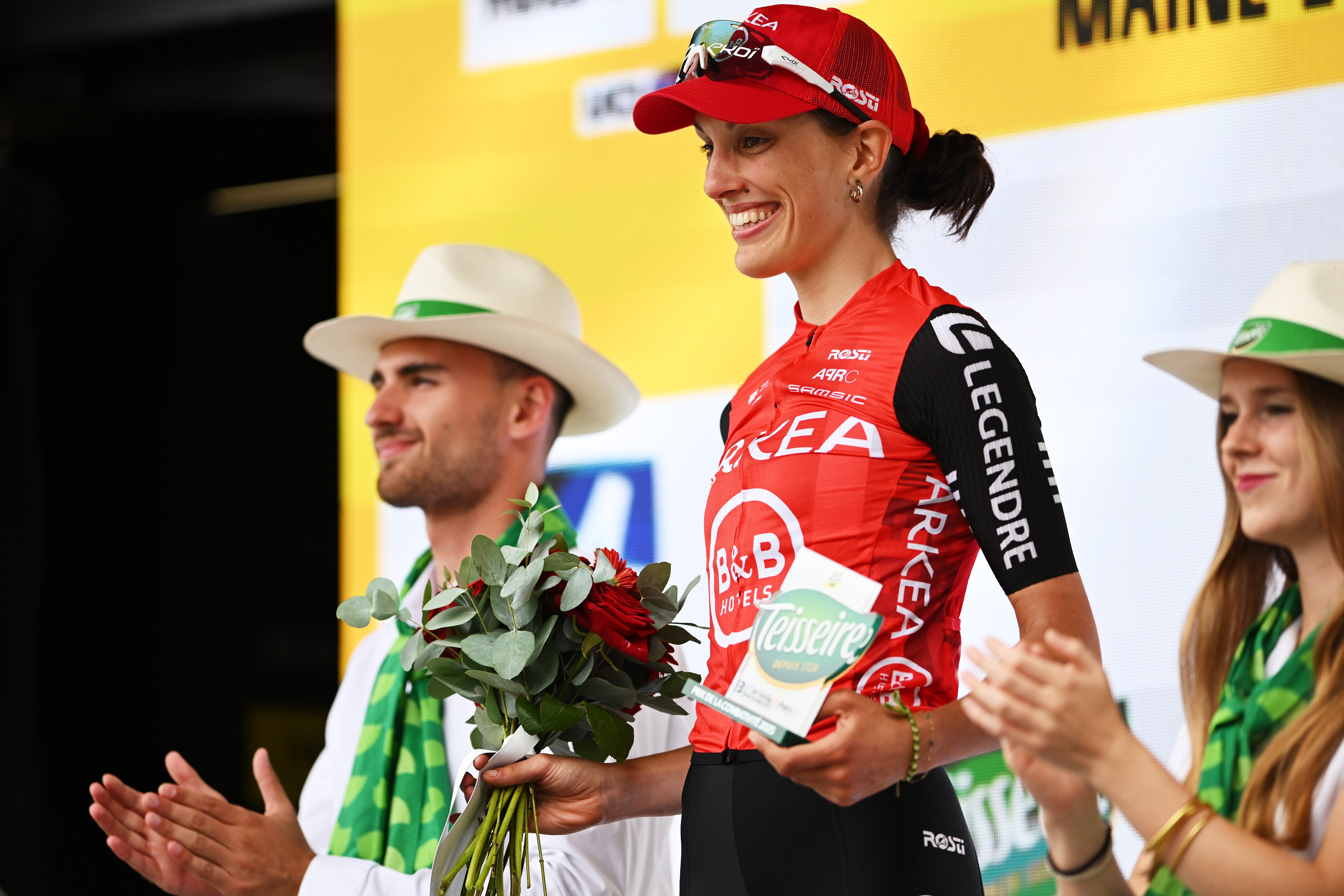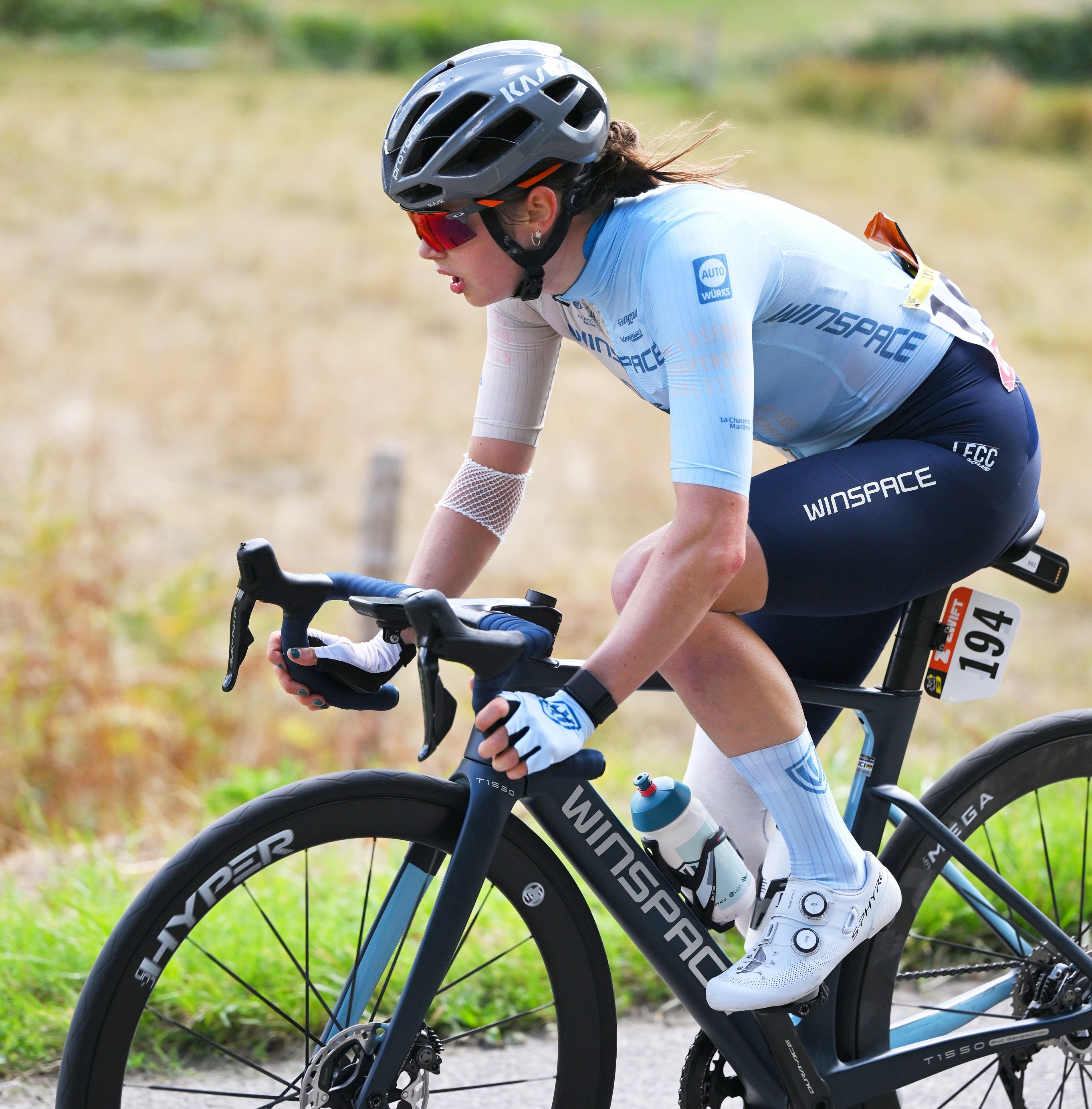Alison Avoine is crying inconsolably. Sitting on the ground, her face in her hands, the Frenchwoman’s soigneur at St Michel – Preference Home – Auber93 tries to comfort her. Fans walk past, filtering away from the barriers by the finish line. They stop to look at the commotion, but the sight is distressing – they dare not stare too long. There are whispers, concerns. What has gone wrong? Why is that poor rider sobbing?
More than half an hour had passed since the end of stage five of the Tour de France Femmes avec Zwift when Avoine crossed the line. She had finished alongside her team-mate, Elyne Roussel, 131st and 132nd on the day – second last and last. Both made the time cut by a handful of minutes.
“I think it was the worst day of my career,” Avoine now recalls. “I don’t even have any words for what happened. My body took a real hit [in a crash on stage four], so it was almost impossible to pedal and follow the infernal rhythm that the Tour’s been raced at since the first day.
“It’s incredible, magical, to be here, but it’s really tough.”
Writing on Instagram, her team-mate Roussel spoke of a similar struggle. The 19-year-old, too, had crashed – twice – on a previous stage. “It’s been 48 hours of pure hell,” she wrote. “But we’re still here.”
Elyne Roussel and Alison Avoine were the last two finishers on stage five.
(Image credit: Getty Images)
For many riders at the Tour de France Femmes, stage wins and high GC placings are, for the moment at least, an impossible dream. Their goal is more straightforward: make it through the nine days, avoid the time cuts, and finish the race.
To do so, they have to keep up with the speed of the pack, led by the best riders in the world. It’s a challenge they relish, one they were all looking forward to, but as the racing grows more intense, the mountains climb higher, and the aches of earlier crashes linger on their bodies, each day can feel like an endless battle.
The latest race content, interviews, features, reviews and expert buying guides, direct to your inbox!
For Avoine and her St Michel team, this Tour has “not gone exactly as we imagined”. The squad went into the final weekend with just four of seven riders remaining, The rest were forced to abandon.
“This year, as a small team, it’s become really difficult to survive on the Tour de France,” Avoine tells Cycling Weekly. “The level has gone up. This is my third Tour de France, and the two previous ones weren’t raced like this – it’s full gas from kilometre zero, and it never lets up.”
Like other riders on the peloton’s smaller teams, Avoine is not solely a cyclist – she also works as a neuropsychiatrist.
Clémence Latimier, a debutant this year with Arkéa-B&B Hôtels, only turned pro three months ago. “It’s really difficult,” the 21-year-old says. “Everyone’s riding hard every day, and there’s a lot of tension in the peloton, but it’s amazing to be here after so little time as a pro.”
Until May this year, Latimier was a club cyclist, racing against amateurs in her native France. The level at the Tour, she says, is “incomparable” to what she’s used to, but she’s not letting it hold her back. After crashing early on the opening stage, she went on to win the combativity prize on day three. Now, she hopes to get to the end. “I just want to have fun each day,” she says.

Clémence Latimier only turned pro in May.
(Image credit: Getty Images)
For ProTeam riders like Avoine and Latimier, the UCI has set a minimum annual salary of €20,000. Those at the top end of the sport – the yellow jersey contenders, Grand Tour winners and former world champions – earn hundreds of thousands more.
The budget difference between the WorldTour squads and those in the lower tier is also stark. Winspace Orange Seal, another ProTeam like St Michel, operates on a purse of around €1 million a year, reveals the team’s manager, Jean-Christophe Barbotin. How does that compare to the average WorldTour squad? “They have about four times more,” he estimates, but there’s no hint of jealousy.
“I think the good thing about having a small budget is that there’s no pressure, for me or my riders,” Barbotin continues. Though they’re unlikely to win stages, those on his team can race care-free, he says, and with no fear of taking on the bigger names.
“I have never heard a rider say they didn’t want to start a race because another rider earns 10 times more than her,” Barbotin says. “Never. They have a great mentality – they love their sport, they love their jobs.”

Former lanterne rouge Kiara Lylyk has her sights set on the finish line.
(Image credit: Getty Images)
Within Winspace’s squad at this year’s Tour is Kiara Lylyk, a 21-year-old from Canada. Riding her race debut, Lylyk found herself trailing the general classification earlier in the week as the lanterne rouge – the last rider in the standings – and marked her status by wearing a red ribbon in her hair. “I was pretty happy to have that,” she laughs. She was less pleased about the circumstances that landed her there.
“On day two, I was feeling awful,” Lylyk says. “I think I had some kind of bug. I was dropped 30km into the race, and I rode the entire stage by myself. With 5km to go, my DS was like, ‘If you make it in 13 minutes, you can start the next day.’ After that day, I’ve just been grateful to be here every day.”
Now, like Avoine, the Canadian’s aim is to just finish the nine days. “Honestly, coming into the race, I didn’t think that would have to be the goal, but now it definitely is,” she says. “Seeing the level here is just nothing like I’ve experienced before. Hopefully in future years I can be at the pointy end. Finishing would be a big accomplishment.”
The tally of abandons sits at 26 with one stage to go in the race. The latest to withdraw was Uno-X’s Susanne Andersen, the fifth rider to finish outside the time limit. Her team will begin Sunday’s final stage with just two names on the start list.
As for Avoine, her teary day from hell is behind her, and she’s still in the race. Following the brutality of stage five, the Frenchwoman wrote on Instagram that she would “fight against myself, and against the passing of time – abandoning will never be an option”.
Sadly, it’s that fate that befell her team-mate and close friend Roussel on day seven. Two days after she finished last, this time on the road to Chambéry, the teenager succumbed to the injuries of her earlier crashes, and waved her white flag.
“She was almost crying on her bike,” Avoine says. “She got into the car that was behind me for the rest of the stage, and I told her through the radio that I was really proud of her. She’s young, she’s only 19, this won’t be her last Tour
As for what remains of Avoine’s own race, the Frenchwoman is determined to make it to the end. “I’m going to try and finish for her [Roussel],” she said. There could be tears of joy when she does.
Explore More
